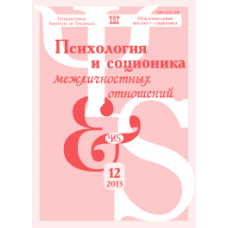Номер № 12/2013 журналу «Психологія та соціоніка міжособових відношень»
Аналітична психологія
Каменєва С.К., Харісова Р.Р.
Зіставлення термінів у соціоніці та психоаналізі
У статті розглядається ряд понять, запозичених соціонікою з психоаналізу (у тому застосуванні до моделі А). Виділяються подібності і відмінності значень і смислів, що вкладаються в них. >Дослідження
Міщенко О.А.
Соціальні аспекти рольової функції
Одна з якостей, що виявляють нашу індивідуальність, — почуття обов'язку. Пізнавши його природу, ми зможемо контролювати його прояви, часом негативні, також це допоможе усвідомити, зрозуміти і прийняти дії оточуючих. Індивідуальне виховання, умови життя, оточення, суспільна мораль, особистий життєвий досвід індивіда — все це впливає на те, в якій діяльній сфері ми втілюватимемо своє почуття обов'язку.
Ключові слова: соціоніка, аспекти інформаційного метаболізму, рольова функція, етика емоцій, почуття обов'язку.
Психологія особистості
Педан Т.П.
Динамічність психіки для захисту від психотравм
Розвиток людини кожного ТІМу та зміни в його поведінкових реакціях внаслідок психотравм. Гнучкість і пристосованість психіки та провертання Моделі-А. Докази, що психіка — жива динамічна система, і поведінка людей може змінюватись як усередині типу за блоками Моделі-А, так і виходити за вроджений тип після перенесених психотравм. І нехай психологи приймають соціоніка — пояснює індивідуальні особливості особистості та прогнозують поведінку залежно від ситуацій і в результаті перенесених психотравм.
Ключові слова: психологія, соціоніка, психіка, програма психіки, унікальність, типовість, ТІМ, розвиток, стаціонарність динамічність, блок, функція, психічна ознака, дуальність, самодостатність, модель-А, больова функція, психотравми, прокручування моделі-А, поведінкові реакції, типи темпераменту.
Методологія
Литвиненко І.Ю.
Психологія та соціоніка
Аналізуються світоглядно-методологічні передумови створення неосоціоніки С. Небикової, а також деякі посили з передмови П. Ципіна до її книги «Неосоціоніка. Досвід психологічного моделювання. Робиться висновок про наявність певних недоліків, що походять з психологічної парадигми для соціонічної побудови, що проявилися в аналізованому матеріалі.
Ключові слова: соціоніка, психологія, парадигма, методологія.
Питання психотерапії
Іванов Д.А.
Епізодична форма алкоголізму
Велика подібність випадків епізодичного (з проміжками до 5 років) одноразового злоякісного алкогольного опою (до найважчої алкогольної коми) у досліджених осіб дозволяє думати про прояви особливої рідкісної форми алкогольної хвороби. З урахуванням підсумовування прийнятого ними протягом життя алкоголю їх слід було б образно назвати "непитущими алкоголіками"
Ключові слова: особлива рідкісна форма алкоголізму, алкогольна кома, інтровертовані особистості, технічний склад мислення. /p>
Дискусії
Козин Р.А.
Вавилон чи Саціон?
Розглядаються принципові питання соціоніки та методи визначення соціонічного типу. Обговорюються переваги та недоліки різних підходів до цієї проблеми.
Ключові слова: соціоніка, психологічний тип, темперамент, теорія функціональних систем, нейропсихологія.
Людина та суспільство
Шлаїна В.М.
Вплив інформації на колектив
Розглядається поінформованість як із соціально-психологічних характеристик колективу. Описано систему внутрішньоколективного спілкування як сукупність різноманітних контактів між членами колективу, а також методи управління керівником службовими та міжособистісними відносинами в колективі.
Ключові слова: колектив, управління, менеджмент, керівник, інформація, тип інформаційного метаболізму.
Мова та семантика
Завгородня В.О.
Аналіз українських народних казок
Описано застосування 26 принципів теорії систем (за В. Д. Єрмаком) для аналізу казкових мотивів.
< em>Ключові слова: соціоніка, теорія систем, системний принцип, цілеспрямованість системи, системні зв'язки, структура казки.
Питання освіти
Булгакова Н.Б.
Природничі казки (атомно-молекулярний світ)
У формі казки викладається механізм утворення кристалічних грат.
Ключові слова: педагогіка, викладання хімії, хімічні елементи, електрон, атом, молекула, кристалічні грати.
Про авторів
Summary
Психологія та соціоніка 12/2013
- Модель: выпуск журнала «Психология и соционика…»
-
$3.00
- Ціна в бонусних бали: 30

